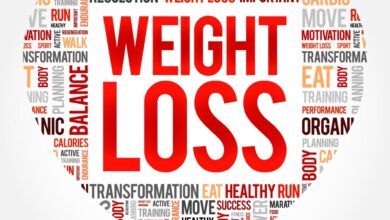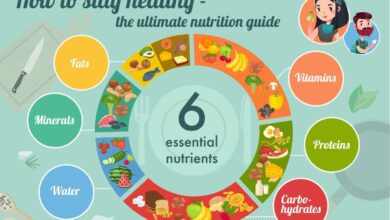
Signs You Need to Add Carbs Back into Your Diet
Signs You Need to Add Carbs Back into Your Diet: We’ve all heard the hype about low-carb diets, but what happens when your body starts screaming for a little extra fuel? Sometimes, the strict limitations of a low-carb lifestyle can lead to unintended consequences.
If you’re experiencing fatigue, brain fog, or other symptoms that seem to linger despite your healthy eating choices, it might be time to re-evaluate your carbohydrate intake.
This isn’t about indulging in sugary treats and processed foods. It’s about recognizing the vital role carbohydrates play in our overall health and well-being. Carbs provide our bodies with energy, support brain function, and even influence our mood. This article explores the signs that your body might be missing out on the benefits of a balanced carbohydrate intake.
Dietary Considerations: Signs You Need To Add Carbs Back Into Your Diet

Adding carbohydrates back into your diet requires careful planning to ensure you’re consuming healthy options that support your overall well-being. It’s crucial to understand the different types of carbohydrates and how they impact your body.
Feeling constantly tired, experiencing brain fog, and struggling to maintain your energy levels? These could be signs that you need to add more carbs back into your diet. Remember, carbohydrates are an essential source of energy, and finding the right balance is crucial.
If you’re looking for ways to incorporate more carbs into your diet, especially during the holiday season, check out this helpful guide on how to build a healthier holiday plate. By incorporating complex carbohydrates like whole grains and vegetables, you can ensure you’re getting the energy you need while still maintaining a healthy diet.
Healthy Carbohydrate Sources
Choosing healthy carbohydrate sources is essential for a balanced diet. These sources provide energy, fiber, and essential nutrients without causing significant spikes in blood sugar levels. Here are some examples:
- Whole Grains:Whole grains, such as brown rice, quinoa, oats, and whole-wheat bread, are rich in fiber, vitamins, and minerals. They provide sustained energy and promote digestive health.
- Fruits:Fruits are naturally sweet and packed with vitamins, minerals, and antioxidants. Choose a variety of fruits like berries, apples, bananas, and oranges to benefit from their diverse nutritional profiles.
- Vegetables:Vegetables are low in calories and high in fiber, vitamins, and minerals. Incorporate leafy greens, cruciferous vegetables, and root vegetables into your diet for optimal health.
- Legumes:Legumes, including beans, lentils, and chickpeas, are excellent sources of protein, fiber, and complex carbohydrates. They can be incorporated into soups, stews, salads, and other dishes.
Simple vs. Complex Carbohydrates
Carbohydrates are categorized into simple and complex carbohydrates based on their chemical structure and how they are digested.
- Simple Carbohydrates:These are sugars that are quickly absorbed into the bloodstream, leading to a rapid increase in blood sugar levels. Examples include table sugar, honey, and fruit juices. While they can provide quick energy, excessive consumption can lead to energy crashes and contribute to weight gain.
- Complex Carbohydrates:These are starches and fibers that are broken down more slowly, providing sustained energy release and promoting a feeling of fullness. Complex carbohydrates are found in whole grains, legumes, and vegetables. They are generally considered healthier options due to their nutrient density and slower digestion.
Feeling constantly drained, experiencing brain fog, or struggling to maintain your workout intensity? These could be signs your body is craving carbs. To truly understand what your body needs, it’s essential to track your progress and make informed decisions.
Check out this article on 3 ways to use tracked data to meet your goals to learn how to use data to fine-tune your diet and fitness plan. By monitoring your energy levels and performance, you can identify if adding carbs back into your diet is the right move for you.
Portion Control and Timing
Managing carbohydrate intake involves both portion control and timing.
- Portion Control:It’s important to consume carbohydrates in appropriate portions to avoid excessive calorie intake and blood sugar fluctuations. A general guideline is to fill half your plate with non-starchy vegetables, a quarter with lean protein, and a quarter with complex carbohydrates.
Feeling constantly fatigued, experiencing brain fog, or struggling to maintain your workout intensity? These could be signs that your body is craving more carbs. While restricting carbs can be effective for some, it’s crucial to listen to your body’s cues.
It’s also important to remember that long-term weight loss isn’t just about calories in, calories out. Strategies to boost weight loss according to psychologists emphasize the importance of mindset and behavior changes. By finding a balance that works for you, you can fuel your body and achieve sustainable weight loss goals.
- Timing:The timing of carbohydrate intake can also influence its impact on your body. Consuming carbohydrates with protein and healthy fats can help slow down digestion and prevent blood sugar spikes. It’s generally recommended to have your largest carbohydrate meal earlier in the day, as your body needs more energy during the day.
When to Consult a Professional
While making informed decisions about your carbohydrate intake can be empowering, it’s essential to recognize when seeking professional guidance is crucial. Consulting a registered dietitian or a healthcare professional can provide personalized recommendations tailored to your specific needs and health goals.
The Importance of Individualized Dietary Plans, Signs you need to add carbs back into your diet
Dietary plans should be tailored to individual health conditions and goals. This is especially important when considering changes to carbohydrate intake, as it plays a significant role in various bodily functions. For instance, individuals with diabetes may require specific guidance on carbohydrate intake to manage blood sugar levels effectively.
Similarly, athletes may need to adjust their carbohydrate intake to optimize performance and recovery.
Potential Risks of Rapid or Drastic Changes in Carbohydrate Intake
Rapid or drastic changes in carbohydrate intake can lead to unintended consequences. For example, abruptly reducing carbohydrate intake can result in fatigue, dizziness, headaches, and difficulty concentrating. These symptoms, known as “keto flu,” are often associated with the body’s adaptation to using fat as its primary energy source.
Conversely, rapidly increasing carbohydrate intake may lead to blood sugar fluctuations and other metabolic imbalances, particularly in individuals with pre-existing health conditions.
It’s crucial to consult a healthcare professional before making significant changes to your diet, especially if you have any underlying health conditions.
Last Recap

While a low-carb diet might be a temporary solution for some, it’s essential to listen to your body’s cues. If you find yourself experiencing persistent symptoms like fatigue, muscle weakness, or mood swings, consider reintroducing healthy carbohydrates into your diet.
Remember, a balanced approach is key. Consult a healthcare professional or a registered dietitian for personalized guidance on determining the right amount of carbs for your individual needs and goals. Your body will thank you for it.






